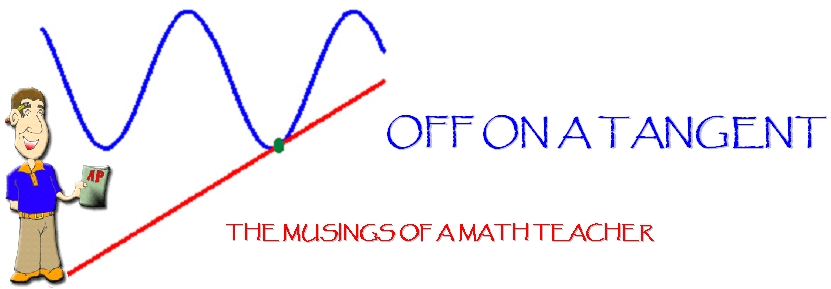 At our school, we have this class we call "Unicorn Time." Basically, it is a 21 minute block of time that serves as a homeroom class where progress reports can be distributed, standardized tests given, announcements administered, and Sportscenter can be viewed.
At our school, we have this class we call "Unicorn Time." Basically, it is a 21 minute block of time that serves as a homeroom class where progress reports can be distributed, standardized tests given, announcements administered, and Sportscenter can be viewed.Originally conceived in haste several years ago as a structured time slot to work on TAKS remediation, the concept has not progressed beyond the inchoate rudiments. At first, I was one of the two chosen math gurus responsible for creating material that each teacher with a Unicorn Time (UT) class could deliver to all students. This included creating detailed handouts with problem descriptions and worked-out solutions that a layperson could follow. We also created Powerpoint presentations and videos that could be projected on the closed-circuit televisions to accompany the awesome handouts. This cycle repeated itself every 4 weeks as the core subjects of English, Social Studies, Science, and Math took turns.
All this sounds good in theory, but it also had several flaws:
First of all, for me, the benefits of NOT having a UT class were outweighed by the added burden of creating all the materials, which went largely unappreciated. Teachers were very uncomfortable, reluctant, and vocally opposed to the idea of teaching something outside their area of expertise, even if it was on a basic-skill level. I think many who complained did so out of reflex, a sense of duty, or on principle, without actually trying. My handouts were so detailed that ANY teacher could have effectively implemented the lesson simply by reading the commentary and following my stage directions.
Additionally, although we expected ALL students to listen and absorb the lesson, work the practice problems, and diligently work through the solutions to learn from their mistakes, we NEVER associated any type of grade to their efforts. Consequently, their efforts went from initially lukewarm to apathetic aloofness after that. How could those UT teachers that were taking the lessons seriously, modeling good learning behavior by teaching a foreign subject, hold students' feet to the fire when their only recourse was to hold unwilling students in low esteem? The program had no teeth, no hook. Relying on the students to be self-motivated or for UT teachers to motivate them is, although idyllic, is pragmatically preposterous!
Another failing of the "idea of the century" is the limited time constraint. Twenty-one minutes is a relatively short amount of time to implement a successful remediation plan to the masses. With UT being used for television school announcements (including skits by our broadcast journalism class), pledge to the flags, and other nuts-and-bolts activities such as taking roll, report card issuance, and student assemblies, there is only 8-10 good minutes left. Assuming I had an eager, captive audience, I can work some mathematical magic in less time than that, but the audience was typically more interested in other things, like watching the clock on the wall wishing they were somewhere else. The result was a vacuous treatment of compulsory material that was delivered without conviction and rebuffed with adolescent disdain.
And so the prescription has been filled year after year, but alas, some things HAVE changed. I am no longer responsible for creating documents and videos to be used during UT. Now, I have my own group of UTers. In fact, there are not TAKS handouts that we have to teach. The instructional videos come on so randomly that we never know when to expect them or what they will be covering. Most of the videos show are above TAKS level questions that happen to have come with some course's ancillary materials. To be sure, I demand that my students pay attention to the videos when they are on , and I even go over the question with the class, but most sit quietly out of respect for ME, and not out of any real desire to improve their cause, after all, there is no grade for UT.
Many teachers have suggested viable, meaningful changes to maximize the benefits of UT. One alternative is to assign incoming freshman with a specific teacher with whom they would keep in UT all four years. The argument is that the teacher would become like a 4-year mentor to the students and get a chance to develop longer-term relationship with more substance. When not teaching TAKS material, class could focus on character development, study skills, or stand-up comedy--anything but babysitting.
Another suggestion is to assign grades to UT and to place those students who are weak in math (for math ALWAYS gets the most attention when scores hit the public) into classrooms of MATH teachers!!! Hello!!!! Most of us are more than willing to take on the responsibility of doing this, even though it would require increase effort and work. Would it be unfair that other, non-core teachers would not have to teach during UT? Sure!! But if helping out weak students is what we are trying to do, and math is typically the targeted subject, it's something we WANT to do as conscientious professionals. Currently, it is a waste of our resources to have a diversity of students who have nothing in common except their graduation class and the first letter of their last name. Although we have eagerly asked for this, and were told that it could and WOULD happen . . . . . . . . . . it hasn't.
Each year as school starts and the powers-that-be are busy fighting fires, reacting to events happening around them, the issue UT gets put on the back-burner (I mean the storage closet.) And so, students appear in their UT class to meet their UT teacher, to enjoy another year in UT filled with wasted time.


No comments:
Post a Comment